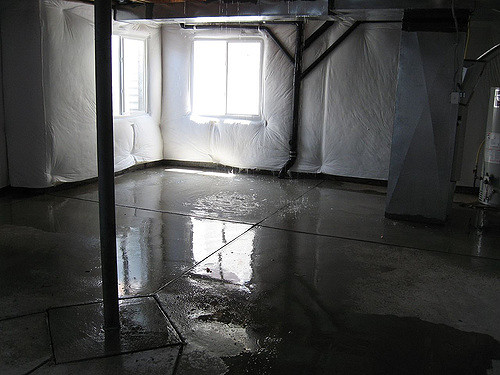FAQ About Basement Waterproofing

Basement waterproofing can be a topic of broad conversation because the solutions run between simple, small crack repair, and major, costly flooding. Because of this, many people want to simply forget that their basement walls are a lot different than the rest of the house!
Here are some frequently asked questions about basement leakage and what you can do to fix it!
How can water get through my basement walls?
Cracks can form very early after the foundation has been formed, and most come within 30 days. Pouring the concrete and shrinkage due to temperature can create cracks that won’t be noticeable until the walls are deteriorating. It can take time, but hydrostatic pressure can mean that these cracks can develop into serious leaks.
These cracks will only get worse over time, which can cause serious problems not just for your foundation and walls, but for your wiring, electronics, and furniture, too. Fortunately, proper repairs and drainage methods can prevent these cracks from becoming floodgates.

How else can basement leaks develop?
Leaks can come in around poorly drained window wells, doorframes with gaps, and pipe entry points. Ensuring that these are sealed properly can be an easy way to prevent leaks.
Sometimes condensation in the basement can be confused for a leak. It’s not the worst case scenario, but it can still cause problems, like mold in your insulation. With a good dehumidifier, it shouldn’t be a problem!
Why is there so much water next to my basement walls?
Weather is a major cause of your moisture problems. Snowmelt and rain are the biggest problems, and a good rain or temperature rise during winter can cause a lot of problems.
The moisture from precipitation can get through cracks because of poor drainage: water sitting around the foundation is able to seep down through the soil and break down the cement. This can be caused by improperly sloped ground, downspouts that don’t extend far enough away from the home, and clogged gutters that cause water to flow over the side and pool around the foundation.
Why should I waterproof my basement?
If you’ve never considered why, here are some of the best reasons: it protects you from future property damage, it increases your property’s value, it can make your foundation more structurally sound, it can lower your energy bills, and it gives you peace of mind!
If you want to use your basement for anything – whether it’s storage or entertaining – protecting your foundation and what’s inside it is very important. You’ll be saving in the long run!
What’s the most effective way to waterproof my basement?
Cracks are fairly common after construction, so the best way to prevent major water damage is to protect the walls and prevent moisture from coming into contact with the foundation in the first place.
We recommend the roundstone treatment – excavating around your foundation, sealing it, then putting a barrier made of crushed stone around it. The roundstone makes it so that moisture seeps down through the cracks, rather than leaching through soil towards your walls.

Round stone
Can I do the job myself?
Some basement waterproofing jobs can be done by you, yes! Many small crack repair jobs can be solved with a visit to a local hardware or building centre, where you can by epoxy crack sealer.
If cracks reoccur or the walls are bulging, however, it’s best to call a professional before major flooding happens. These will require extensive exterior work with equipment and skills you might not have.
What’s the cost of getting my basement repaired?
This is one of those things we can’t really predict; Ashworth Drainage offers free, no obligation quotes, so you can consider the solutions before committing.
To prevent costs from getting too high, it’s best to tackle the problem early and properly. Drainage that prevents moisture from getting at your walls in the first place is good drainage, and we can do a lot of different things that’ll send water away from your walls and keep your basement nice and dry!
